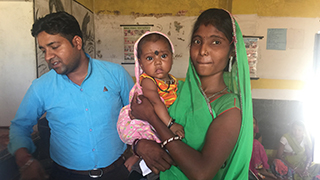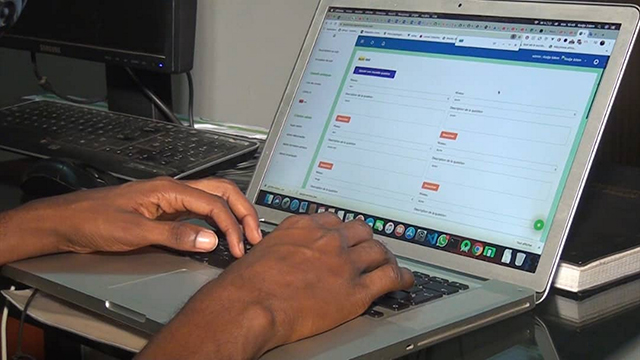Improving mother and child health – Khushi Baby
— India —

BACKGROUND
Initially one of the 2017 winners of the Global South eHealth Observatory, the Khushi Baby programme received additional funding from the Fondation Pierre Fabre in 2019 to support a new implementation phase in the Indian State of Rajasthan.
Introduced in 2014 by the Indian NGO of the same name, Khushi Baby was designed to increase child immunisation rates among India’s poorest populations by providing “last-mile” service. The project is based on a simple, inexpensive solution to ensure medical monitoring of children in rural areas where communities are not adequately aware of the importance of immunisation and the care available to them in local health centres. In this country, each year, 500,000 children under the age of five die from diseases that could have been prevented by vaccination.
AN ECONOMICAL INNOVATION
Khushi Baby is an eHealth innovation based on storing medical information inside an NFC chip, itself inserted in a pendant worn by children. The child’s medical record is updated over the course of medical visits and can be accessed by social workers and health workers using a mobile application. The data is also aggregated on a platform to allow monitoring by health authorities.
The device is wholly designed to fit with the local context: low cost (less than a dollar to produce), waterproof, does not require a battery, and uses a black cord similar to that of the necklaces that babies in India already regularly wear.
SCALING IN RAJASTHAN
The project began in the State of Rajasthan in north-west India and was supported by the Fondation Pierre Fabre in 2017 for its first roll-out phase in 350 villages, reaching 25,000 children. In 2019, the Global South eHealth Observatory granted Khushi Baby additional support to extend the solution to the district of Udaipur where, by 2022, it should cover a total of nearly 1,000 villages and reach 600,000 patients.
In May 2020, Khushi Baby was chosen as a leading platform by Rajasthan’s health authorities for a three-year period. It was used as part of the Covid-19 prevention plan and for monitoring tuberculosis cases. A partnership was also signed between the NGO and Google AI for Social Good to assess the quality of the data collected.
KEY FACTS
_____
Priority
eHealth
Programme
2017 then 2019
Type of involvement
Distributor and operator
Type of involvement
One-year support and financial aid awarded to the programme as one of the Global South eHealth Observatory’s winning projects in 2017 and 2019
Khushi Baby was chosen as a leading partner in technical support by the Rajasthan Ministry of Health and Family Welfare. Our platform has been implemented state-wide for medical monitoring of more than 200,000 mothers and children and has been used as part of the Covid-19 screening campaigns among the most vulnerable populations. All this was made possible by the support and funding provided by the Fondation Pierre Fabre.”
Mohammed Shahnawaz
Operations Director for the NGO Khushi Baby, India
ACHIEVEMENTS AND FUTURE INITIATIVES
Achievements
200,000
mothers and children monitored in 2020 in the State of Rajasthan
600,000
patients: Coverage target in 2022
66%
increase in immunisation coverage*
26%
decrease in malnutrition*
(*) Randomised controlled trial involving 3,200 mothers of young children, 2020
See also
The Global South eHealth Observatory
The Global South eHealth Observatory, a Fondation Pierre Fabre initiative, is designed to identify, document, promote and help develop eHealth initiatives that improve access to quality healthcare and medicines for the most disadvantaged populations in ressource-limited countries.
30/07/2018See also
Creation of the National Digital Health Center
In 2021, Togo’s minister of Health and Public Hygiene asked the Foundation to help it draw up and roll out a national eHealth strategy. The creation of a “National Digital Health Center” marks an essential step forward in the drive to provide a coherent, sustainable development framework.
28/11/2022Follow our action
Mobile Clinics in the Central African Republic: Caring for Survivors of Violence
This unique initiative in the Central African Republic enables thousands of women to access crucial healthcare services and rebuild their lives.





